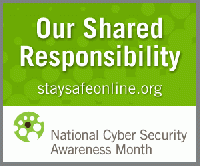 This week of NCSAM we offer suggestions for protecting your cyber persona.
This week of NCSAM we offer suggestions for protecting your cyber persona. This week of NCSAM we offer suggestions for protecting your cyber persona.
This week of NCSAM we offer suggestions for protecting your cyber persona.
Social Networks
Social networks such as Facebook and Twitter are becoming a larger and larger part of students’ lives, and employers are already aware of this, including social media as part of their pre-employment checks. Instead of warning you as to what they may look for or giving you a history of Facebook’s changes in security policy (by the time we finished writing that, they’d have changed behind our backs already), we’ll give you an overview of where to optimally set your privacy settings.
The majority of the “permanent” Facebook privacy settings can be accessed by clicking on the dropdown arrow at the top right of the screen, then by clicking on “Privacy Settings.” The top of the page is a short primer on changing in real-time, which can be done as necessary if you’re uncomfortable with someone seeing a specific post. The second option, “Control Your Default Privacy,” is the most important here. The first two options, Public and Friends, are as they sound, opening your posts either to the world or to your world. If you have any specific people who you wish to hide last Friday night from, the easiest way is to add them to a custom friends list under the homepage Friends options. From there, restrict that list under the “Hide this from:” option under “Custom.”
The rest is moderately self-explanatory. “How You Connect” gives you the option to restrict messages/friend requests/contact info; the “Timeline and Tagging” options refer to who can post on your timeline and how others’ tags show up. The “Ads, Apps, and Websites” settings are worth reading through for a tutorial on how Facebook shares information, then are worth a cursory glance once in a while to ensure that no unintended apps have shown up to sell your email to spammers. “Limit the Audience…” is a one-click fix-all to strengthen all past posts to your tightest preferred settings, whereas “Blocked People and Apps” permanently fixes that annoying aunt who only posts cute cat pictures two months after you’ve seen them on Reddit.
Like this page to receive updates about how to protect your information both on and off Facebook: http://www.facebook.com/security
For even more NCSAM tips follow us: facebook.com/ICInfosec | twitter.com/IC_infosec
https://www.ithaca.edu/intercom/article.php/20121015153045746